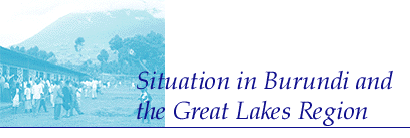

January 2000
Burundi is one small country in the Great Lakes region of Africa beset with civil war, violence, and the breakdown of its society. Rwanda with its 1994 genocide, the Congo with its nine-country African "world war", and Uganda with conflict along its western and northern borders are also part of this unsettled region. Briefly what is the current situation in Burundi and neighboring countries?
When the African Great Lakes Initiative visited Burundi in January 1999, the situation was fairly calm. During the week I was there, one small massacre was reported in a remote area of the country near Rwanda. Former Tanzanian President, Julius Nyerere was leading eighteen Burundian parties towards a peace settlement in talks in Arusha, Tanzania. The economic situation was poor, partly because of the unrest and partly because of economic sanctions imposed in 1996 when Pierre Buyoya seized power in a military coup. Shortly after we left the sanctions were lifted due to the progress that was being made at the Arusha peace talks.
However by the time the team for the Kamenge Reconciliation and Reconstruction Project arrived in July 1999, the situation had deteriorated. The peace talks began collapsing and shortly thereafter, Julius Nyerere became ill. Various rebel groups, including two militant Hutu parties who were not among the eighteen parties at the peace talks, began to step up their attacks. Usually this meant that they would kill a few Burundian Tutsi soldiers, while the soldiers would retaliate by killing a number--sometimes a large number--of Hutu civilians, accusing them of harboring the rebels.
As the number of incidents increased with more and more people being killed, the Tutsi army forced almost 500,000 Burundian Hutus living in Bujumbura Rurale (the rural areas around the capital of Bujumbura) into displaced persons camps. A few Hutu took refuge in the compound of Burundi Yearly Meeting in Bujumbura, but neighbors complained and the army removed them. Conditions in these camps are dreadful--cholera has broken out in some camps , and illness which only occurs in situations with a total lack of sanitary facilities.
Aid organizations had difficulty reaching many of the fifty-eight camps. Doctors without Borders withdrew from the camps because they opposed the policy of forcing people into displaced persons camps and were not receiving adequate access to the camps. This unrest, together with poor growing conditions in the last two years, has led to a food shortage in the country and increases in the price of food and other necessities.
In October, a rebel group killed two UN workers so the United Nations withdrew back into Bujumbura only. Then on October 14, Julius Nyerere died.
This upsurge in violence is also due to the larger political situation in the Great Lakes region. The Congo has essentially been divided into five sections--the Government section headed by President Kabila, an Angolan area, a Rwandan area, and two Ugandan areas. At the Great Lakes Policy Forum in Washington, DC, one speaker called this a state of neither war nor peace. There may be fighting on the edges of the various sections, but each group is essentially "milking" its area (in natural resources, the Congo is one of the richest nations in the world). While a Lusaka Peace Accord has been signed by all the parties in the Congo including the nine nations involved in this "African World War," little progress has been made towards a unified Congo. But one of the reasons for this war is that the Interahamwe (militia) and former Rwanda soldiers who were responsible for the genocide in Rwanda and later controlled the million or more people in the refugee camps in the Congo are still armed rebels. They have attacked Uganda, killing the eight tourists in one incident and over Christmas killed 31 Tutsi at a returned persons camp in sight of Mutura Friends Church where the January delegation visited. The Interahamwe have also teamed up with the Angolan rebels, UNITA, and with the militant Burundian Hutu rebels. As pressure is being put on them in the Congo, they are reported to be moving into Tanzania and attacking Burundi.
In replying to a message from Ray Boucher, a member of the Kamenge team, David Niyonzima, the General Secretary of Burundi Yearly Meeting , reports:
I must say that the conditions in Burundi sound much scarier outside the country than inside the country. It is true that
the conditions in the camps are very deplorable and horrible... Otherwise things are as usual at least here in Bujumbura. There is fighting in the Eastern part of the country. Adrian {a Kamenge team member} will remember the area where we were trying to reach with Gabriel when we were exploring the hills for our reforestation project. There is fighting there with rebels.
Is there an encouraging news? Jimmy Carter has gotten the Ugandan and Sudanese Governments to agree to a cease fire and the end of supporting the opposing country's rebels. The Lord's Resistance Army in northern Uganda--one of the most brutal of the rebel groups know for kidnapping school children and forcing the boys to become soldiers and the girls to become concubines--is being disbanded. Let us pray that peace can return to that area. Nelson Mandela has been appointed to new leader of the Burundian peace negiotations, but two militant Hutu rebel groups do not accept him because they accuse South Africa of supplying weapons to the Burundian army.
This is not the time to abandon our Friends in Burundi. I remember when I was there, Burundians everywhere were making bricks. For the Kamenge Project rebuilding the residency/guest house, the bricks the team used were still warm from being fired. Resiliency is part of the human condition.
About AGLI | Projects and Reports | Peace Team Opportunities | Contact us | What's Related | Home Page